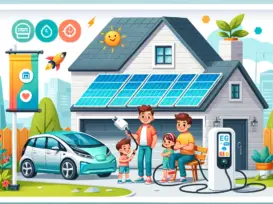Grus Home Energy - EV charging costs
Understanding the Costs of EV Charging: How Much Does it Really Cost to Charge an Electric Vehicle?
As electric vehicles (EVs) become more popular, many consumers are curious about the costs associated with charging these environmentally-friendly vehicles. One of the key selling points of EVs is their lower operating costs compared to traditional gasoline-powered vehicles. However, the actual cost of charging an EV can vary depending on several factors, including the type of EV, the cost of electricity in your area, and your driving habits.
First and foremost, it’s important to understand the different types of EV charging options available. There are three main levels of EV charging: Level 1, Level 2, and DC fast charging. Level 1 charging uses a standard household outlet (120 volts) and is the slowest method of charging, typically providing about 4-5 miles of range per hour of charging. Level 2 charging uses a 240-volt outlet and is faster, providing about 10-20 miles of range per hour of charging. DC fast charging is the quickest option, providing up to 60-80 miles of range in just 20-30 minutes of charging.
The cost of electricity can also greatly impact the cost of charging an EV. In the United States, the average residential electricity rate is around 13 cents per kilowatt-hour (kWh). To calculate the cost of charging your EV, you’ll need to know the battery size of your EV in kilowatt-hours and the efficiency of your EV in miles per kWh. For example, if your EV has a 60 kWh battery and gets 3 miles per kWh, it would cost about $7.80 to fully charge your EV from empty to full (60 kWh x 13 cents/kWh).
Another important factor to consider is your driving habits. If you have a long commute or frequently drive long distances, you may find yourself charging your EV more often, resulting in higher charging costs. On the other hand, if you mostly drive short distances and can take advantage of home charging, your charging costs may be significantly lower.
It’s also worth noting that some EV charging stations may have additional fees, such as connection fees or membership fees. These costs can vary depending on the charging network and location of the charging station. Additionally, some states offer incentives or rebates for EV owners, which can help offset the cost of charging an EV.
In conclusion, the cost of charging an EV can vary depending on a variety of factors, including the type of EV, the cost of electricity in your area, and your driving habits. While EVs are generally cheaper to operate than traditional gasoline-powered vehicles, it’s important to consider these factors when calculating the true cost of charging an EV. By understanding these costs, you can make informed decisions about whether an EV is the right choice for you.
©2025 All Rights Reserved. Grus IoT Co.,Ltd.
